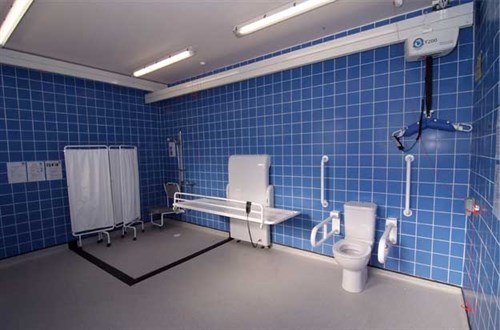Information About Changing Places
- Venues |
- Top Tips |
- Red Cord Cards |
- Resources |
- Donate
A Changing Places toilet is a fully accessible toilet with the following additional equipment: a height-adjustable changing bench, an overhead track or mobile hoist; a peninsular toilet, privacy screen and enough space for up to two carers as detailed in British Standard BS800: 2009. These toilets should be provided in addition to standard accessible toilets.
Research commissioned by Mencap highlights that 230,000 people in the UK need assistance to toilet and/or change continence pads. Users include people with profound and multiple learning disabilities and people with a range of other disabilities including Cerebral Palsy, Motor Neurone disease, Multiple Sclerosis, stroke, some older people and other specific disabilities. Our estimation of up to a quarter of a million users will increase in the future. For some groups the prevalence of individuals will increase, e.g. people with intellectual disabilities and people of advanced age, increasing the need for and relevance of Changing Places toilets.
The Changing Places consortium comprises Mencap, PAMIS, Centre for Accessible Environments, Nottingham City Council, Dumfries & Galloway Council, and the Scottish Government. The Changing Places campaign supports the rights of people with profound and multiple learning, and/or other physical disabilities, to access their community. Without Changing Places toilets, carers are forced to change their loved ones on toilet floors or have to stay at home. For information and advice on changing places facilities in England, Wales and Northern Ireland email, ChangingPlaces@mencap.org.uk, for Scotland email, pamischangingplaces@dundee.ac.uk.
Aveso Ltd, sponsor the Changing Places campaign and is a joint venture between OpeMed and Astor Bannerman specialising in the design, installation and maintenance of Changing Places Toilets. For more information on the official sponsor Aveso, please email info@aveso.co.uk.



 Follow Euan's Guide on Instagram
Follow Euan's Guide on Instagram
 Follow Euan's Guide on LinkedIn
Follow Euan's Guide on LinkedIn
 Follow Euan's Guide on Facebook
Follow Euan's Guide on Facebook

